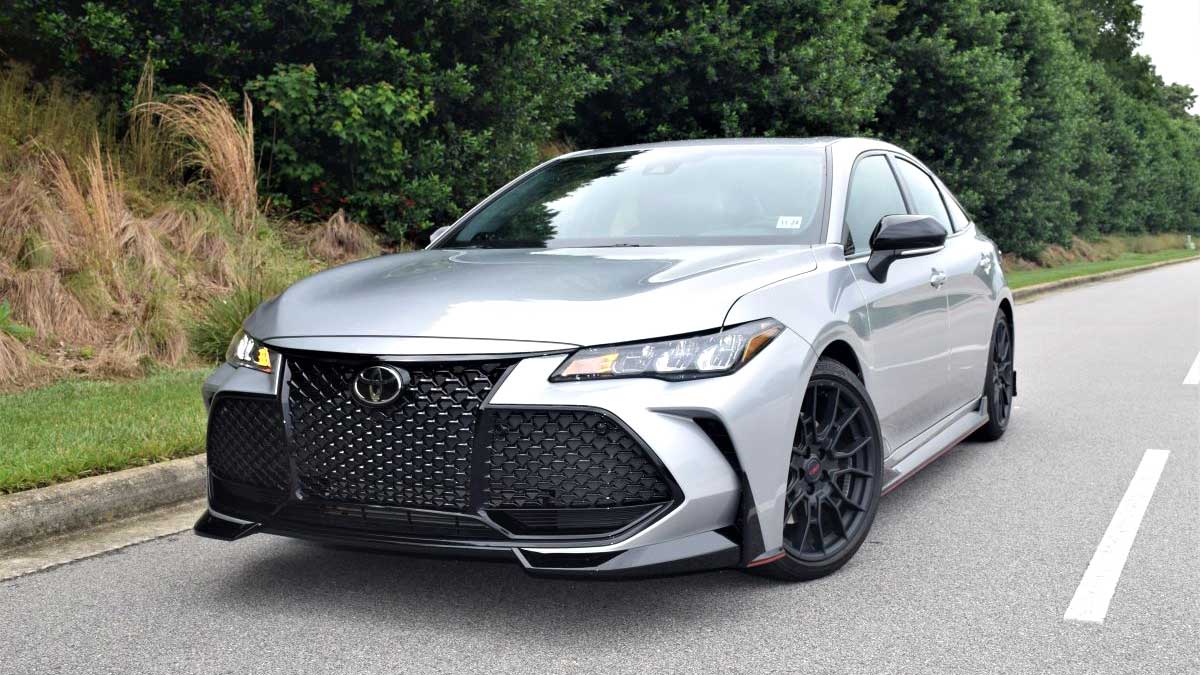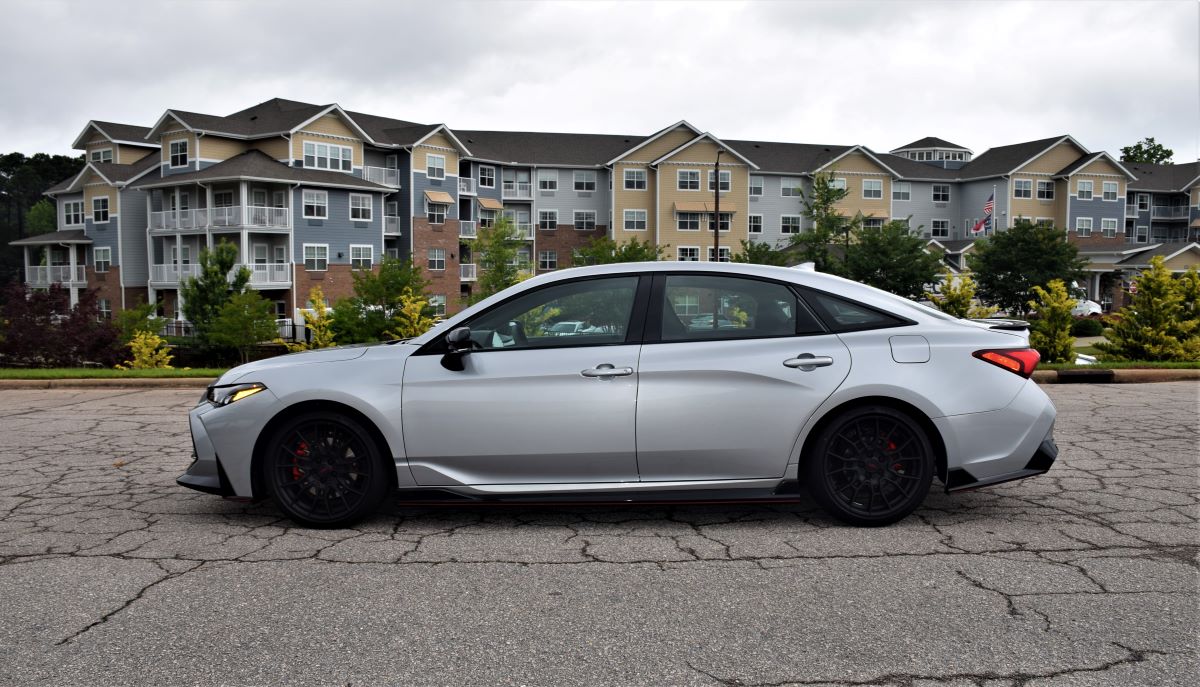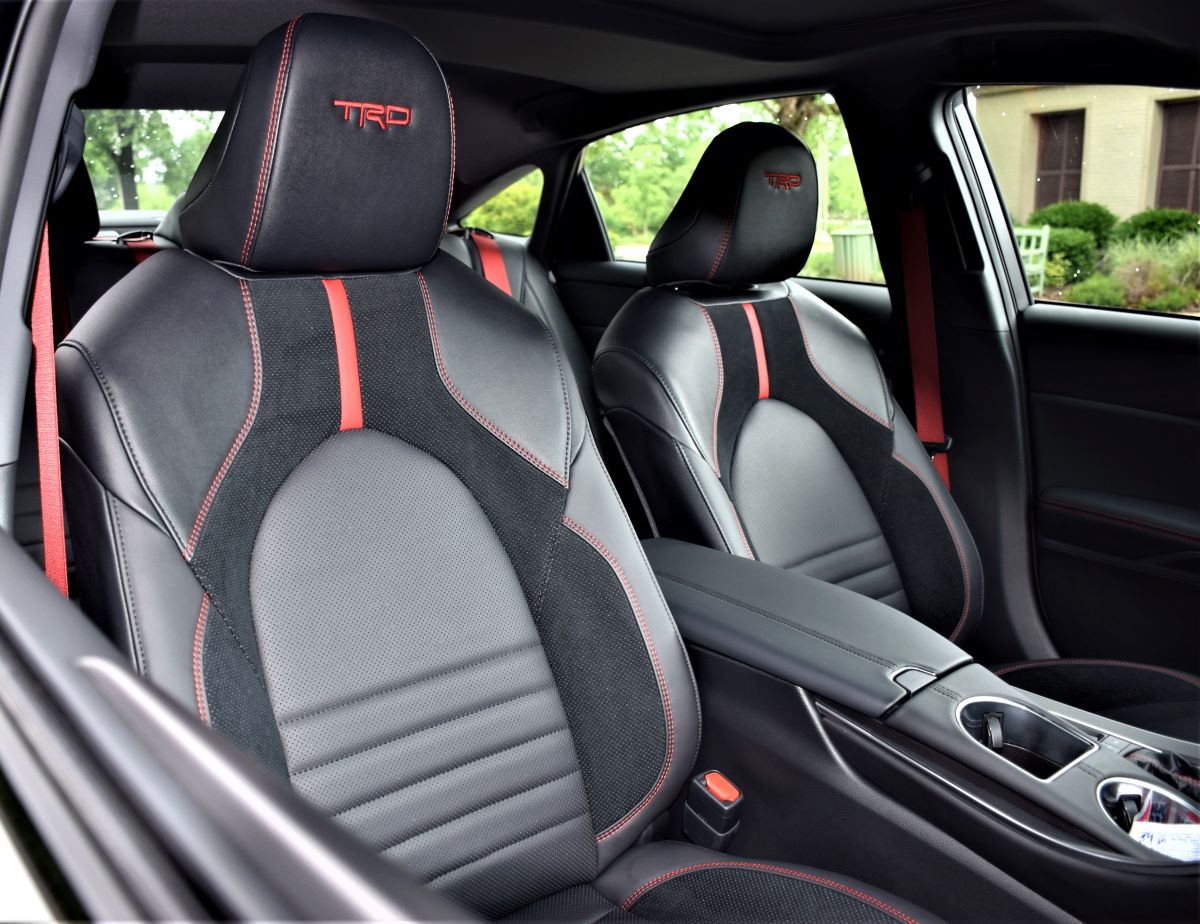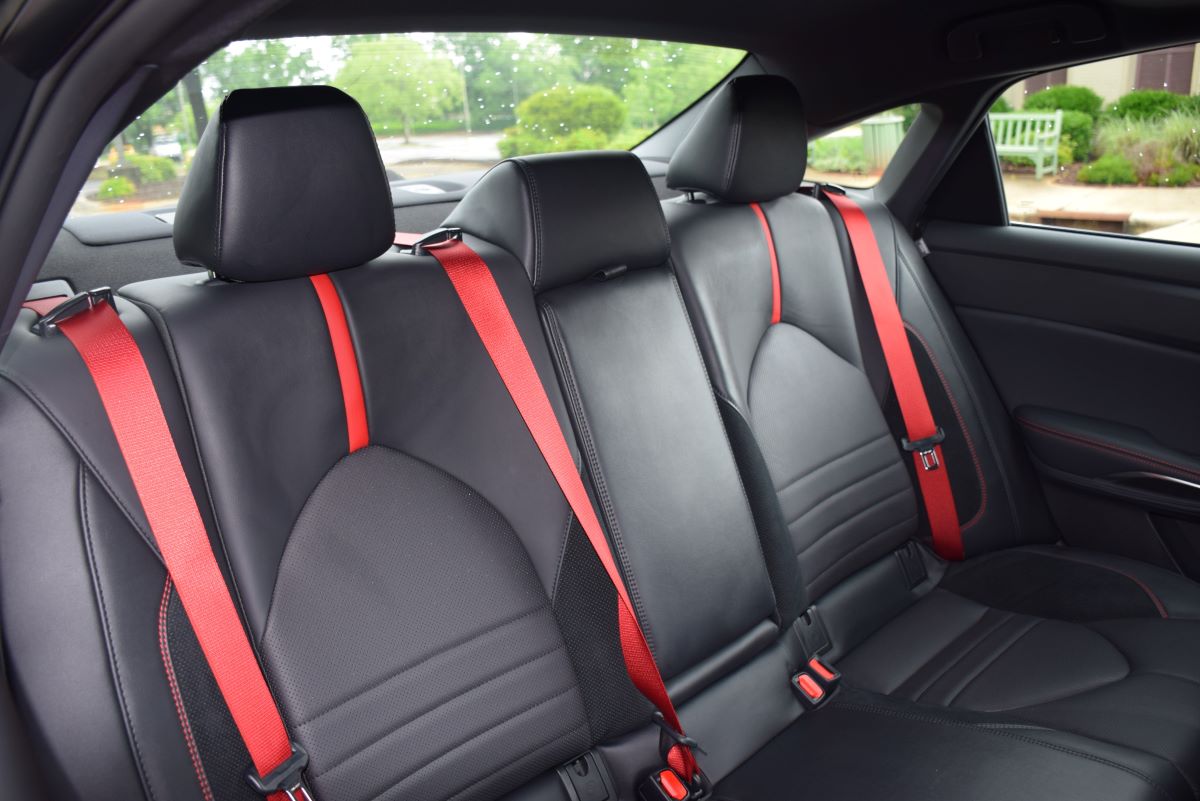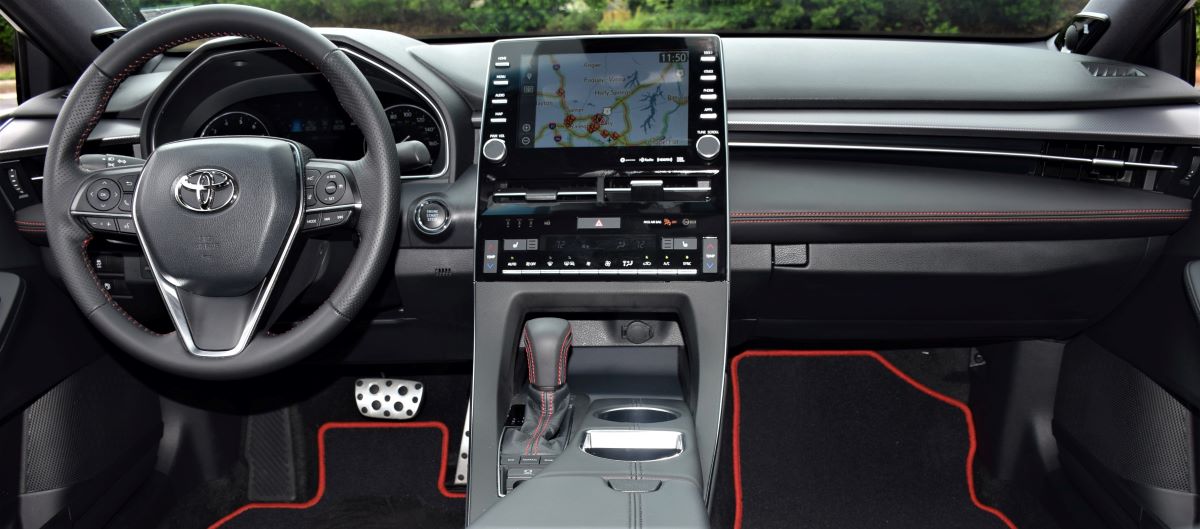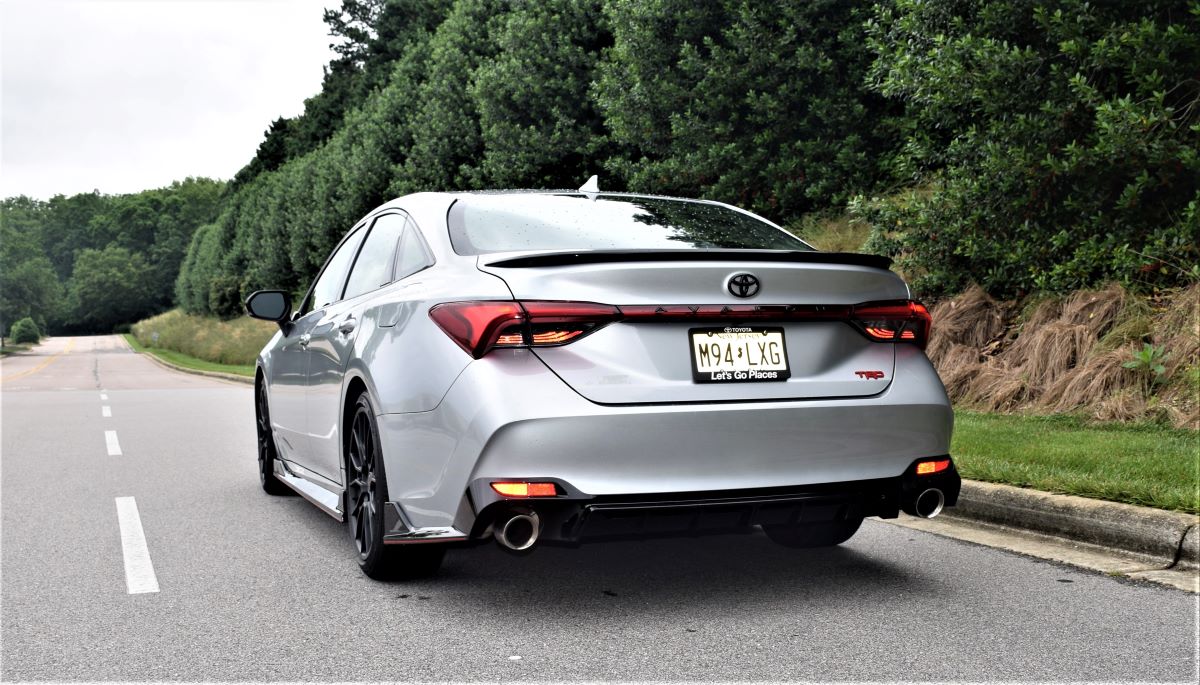Toyota’s flagship sedan now offers a TRD option.
We may be looking at crossovers more than ever before, but there are some sedans on the market worth exploring, including the 2020 Toyota Avalon.
The Avalon is now in its fifth generation (second generation for the hybrid) and was overhauled in 2019. We think the current iteration is the best one yet, offering an ideal combination of style, performance, amenities, and reliability.
2020 Toyota Avalon Review
Toyota offers the 2020 Avalon in XLE ($35,875), XSE ($38,375), Limited ($42,175), TRD ($42,375), and Touring ($42,575) trims. Add $1,120 for the destination charge.
A hybrid version is also available and comes in three trims: XLE ($37,000), XSE ($39,500), and Limited ($43,300). However, our focus is on the gas model – we’ll mention the hybrid only where appropriate.
The Avalon has standard front-wheel drive and will soon offer all-wheel drive, beginning with the 2021 model year. This large sedan seats five. Our test model was an Avalon with the new TRD trim. TRD stands for “Toyota Racing Development,” which represents the automaker’s performance arm.
Exterior
The full-size Avalon and Camry share the same platform. In fact, most modern Toyota models share the same architecture, which opens a world of opportunities, including enabling both sedans to offer all-wheel drive.
As for the Avalon, it is about six inches longer between the wheels than the Camry. Both models share a sporty appearance with the Avalon possessing a more refined look overall. The Avalon’s gaping grille hints at Lexus, although its layout is not the same as the luxury marque’s hourglass grille.
Toyota’s models feature large cutouts, strong signature lines, and pronounced body sculpting. We like the Avalon’s rear quarter side windows, a design absent from many of today’s sedans.
It supplies lift to the beltline and intersects nicely with the falling roofline. What’s especially fetching are the 19-inch matte black alloy wheels set within the all-season black radial tires.
The Avalon is equipped with standard LED reflector headlamps and LED daytime running lights with an automatic on/off feature. LED tail lamps are standard. Other features include intermittent wipers, power outside mirrors, and dual exhaust with chrome tips.
There are many upgrades available, with most of these bubbling up through various trim steps. These features include:
- enhanced headlight and tail lamp lighting
- blacked-out grille to replace the standard chrome grille
- heated side mirrors
- power sliding moonroof
- dual exhaust with quad chrome tips
- sport sound-tuned exhaust
The TRD trim features special badging, additional blacked-out features, and a special rear spoiler.
Interior
Inside, we found the Avalon’s cabin spacious and luxurious. The Avalon has long been the “budget” version of the Lexus ES, but it really isn’t so anymore.
In fact, it strikes its own design essence and does so with plenty of room for five. Indeed, the rear seat features 40 inches of legroom and sufficient hip room. We still think two in the rear is the ideal, but three can fit.
Quality materials abound with very little plastic anywhere. Lots of soft-touch material covers the dashboard and door inlays. The seats in most trims feature synthetic leather with a look and feel paralleling the real thing. The Touring edition has leather-covered seats.
You’ll find aluminum trim on the XSE and Touring editions, while the Limited has wood trim. As for the TRD, the sufficiently bolstered sport buckets seats feature attractive red stitching and TRD embossing on the headrests. Red accent inlays and red seat belts offer a bright contrast to the gray seats.
Toyota equips the 2020 Avalon with keyless entry and push-button start, full power accessories, an electric parking brake, a tilt-and-telescopic steering column, and dual-zone climate control.
All trims have heated front seats and are power controlled (the driver’s seat offer power lumbar support). The Touring and Limited editions feature heated outboard rear seats. Moreover, the TRD, Touring, and Limited editions come with aluminum pedal covers.
The Avalon’s 60/40 split fold-down seat supplies access to the trunk. The trunk measures 16 cubic feet and that’s slightly below average for the segment.
Safety
Toyota is at the forefront of driver-assist technology. Moreover, it offers more standard features than nearly every competitor. You’ll even find some luxury models don’t match the Avalon without charging extra for these features.
Under the Toyota Safety Sense P (TSS-P) umbrella, the Avalon has automatic high beams, a pre-collision system with pedestrian detection, lane departure alert with steering assist, and full-speed dynamic (adaptive) radar cruise control. The Avalon also has blind-spot monitoring with rear cross-traffic alert.
Available as part of a package upgrade on the Touring and Limited editions is intelligent clearance sonar with rear cross-traffic braking. The ICS is bundled with a surround-view camera system upgrade over the standard rear-view camera.
Technology
Toyota equips the standard Avalon trim with an 8-speaker audio system, HD Radio, satellite radio, a 9-inch touch-screen display, an audio jack, two USB ports, Bluetooth connectivity, Siri Eyes Free, and smartphone compatibility with Apple CarPlay and Android Auto. That’s a generous package of included amenities.
As part of a package option on the first three trims, but standard elsewhere is a 14-speaker JBL audio system with navigation. Although we think the smartphone compatibility is better than Toyota’s navigation system, the JBL audio package is wonderful as it features a subwoofer and a 1200-watt amplifier.
A Qi-compatible wireless charging system is standard on all except the base trim, but it is available as part of a package upgrade with the XLE.
Performance
Motivating every 2020 gas Avalon is a 3.5-liter V6 engine with 301 horsepower and 267 pound-feet of torque. This engine works with an 8-speed automatic transmission.
You may have heard that the Avalon will receive an all-wheel-drive option, just like the midsize Camry sedan. While the Camry gains all-wheel drive for the 2020 model year, the Avalon won’t see it before 2021. Thus, every Avalon is front-wheel drive.
The Avalon Hybrid comes with a 2.5-liter four-cylinder engine, two electric motors, and a continuously variable transmission. This one produces a net 215 horsepower and an EPA-estimated 43 mpg. Compare that to the combined 25 or 26 mpg of the gas model and the difference is remarkable.
Our TRD trim featured paddle shifters and a sport mode. A specially-tuned TRD cat-back dual exhaust develops a guttural idle and acceleration sound. A soundtrack pushes noise into the cabin, a feature we can live without.
The TRD team also equips this model with thicker underbody braces for torsional rigidity. TRD coil springs lower the sedan’s height by 0.6 inches for a reduced center of gravity, while stiffer TRD stabilizer bars increase roll stiffness. Simply put, it makes for a better handling sedan.
We found the Avalon’s off-the-mark acceleration strong and its passing power more than up to the task. Outside of the Dodge Charger and Chrysler 300, it is one of the strongest engines in its class.
Even with front-wheel drive, we found that this sedan stays planted as it navigates twisty roads. You’ll still notice some wheel slippage when pulling out of corners as understeer kicks in. It’s no more than a trifling inconvenience.
The Avalon offers a very comfortable ride and is relatively insulated from outside noise. We say relative because the outgoing Buick LaCrosse is better in that department. Nonetheless, we give the Avalon TRD a positive score in all things driving comfort.
Competitive Set
There aren’t all that many models left in the large sedan segment with the departure of the Ford Taurus, Chevrolet Impala, Hyundai Azera, and the Buick LaCrosse. The Kia Cadenza is perhaps the Avalon’s closest competitor.
The Nissan Maxima is a flagship model worthy of consideration although it is roughly the same size of the midsize Altima.
A pair of traditional rear-wheel-drive models are also worth exploring: the Dodge Charger and Chrysler 300. Both offer available all-wheel drive.
Our Recommendation
We think any Avalon trim above the base XLE is worth exploring. But it the three top trims, separated by $200 at each level, has our attention. The TRD brings the performance edge, while the other two trims bring the luxury features we mentioned earlier.
Regardless of your pick, we think the Avalon in any guise is a strong model, but do consider the Avalon Hybrid if green driving appeals to you.
2020 Toyota Avalon Specifications
| 2020 Toyota Avalon | |
|---|---|
| Segment | Full-size Sedan |
| Price Range | $35,875 to $42,575 |
| Destination Charge | $955 |
| Standard Engine | 3.5-liter, V6 |
| Horsepower | 301 hp @ 6,600 rpm |
| Torque (lb.-ft.) | 267 lb.-ft. @ 4,700 rpm |
| Transmission | 8-speed automatic |
| Seating | 5 |
| Curb Weight (pounds) | 3,560 to 3,704 |
| Wheelbase (inches) | 113.0 |
| Length (inches) | 195.9 |
| Width (inches) | 72.8 |
| Height (inches) | 56.5 |
| Headroom (f,r…inches) | 38.5, 37.9 |
| Legroom (f,r…inches) | 42.1, 40.3 |
| Shoulder room (f,r…inches) | 58.3, 57.1 |
| Hip room (f,r…inches) | 55.8, 54.8 |
| Storage (cubic feet) | 16.09 |
| Gross vehicle weight (pounds) | NR |
| Towing (pounds) | NR |
| Payload (pounds) | NR |
| Fuel | regular |
| Fuel Tank (gallons) | 14.5 or 15.8 |
| EPA Fuel MPG (city/highway/combined) | 22/32/26 (XLE); 22/31/25 (All Others) |
| Manufacturing Plant | Georgetown, Kentucky |
Data compiled by Tom Keegan. Specifications supplied by the manufacturer.
See Also – Toyota: Camry, Avalon Sedans Gain An All-Wheel-Drive Option
Photos copyright Auto Trends Magazine. All rights reserved.
- 2024 Ford Maverick (Looks Like a Truck, Drives Like a Car) - Apr 20, 2024
- 2024 Mazda CX-50: A Compact SUV with Premium Aspirations - Apr 15, 2024
- 2024 Ford Mustang (Iconic Pony Car Evolves) - Apr 4, 2024

